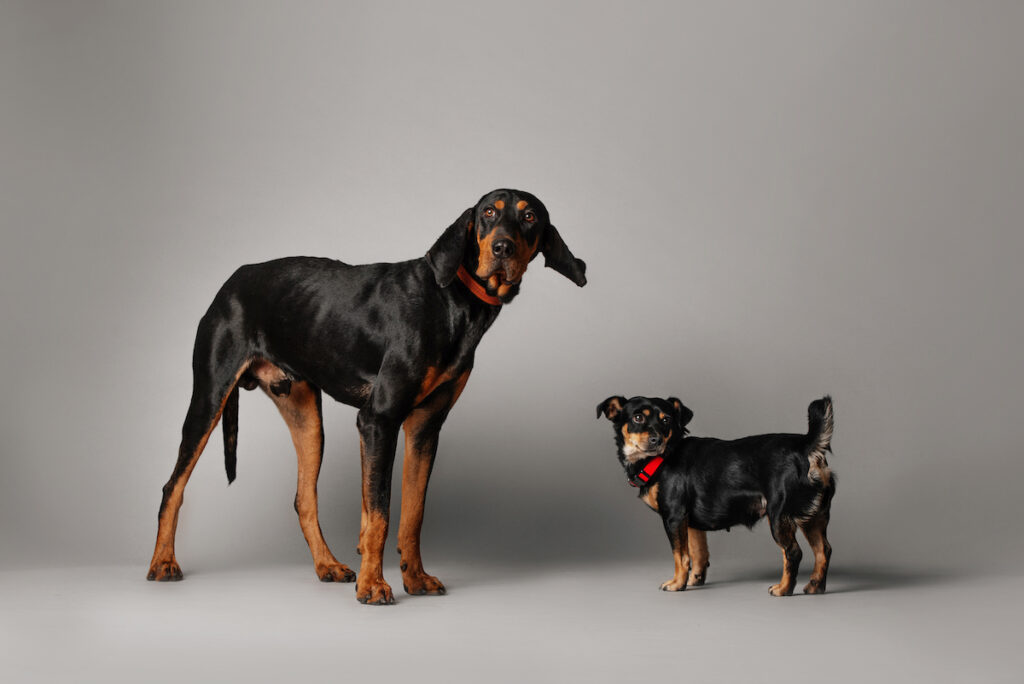When thinking about what breed of dog you should get, one of the first decisions is to look at the size of a dog. Picking a size will rule out some breeds pretty quickly. Here are some questions to ask yourself:
- Do you have enough space for such a dog ?
- Do they require any special treatment (e.g. need to be kept indoors)?
- Are they particularly helpful with any tasks that you may need them for ?

Reasons for a getting a larger dog
Here are three main reasons why someone might pick a large dog:
- Companionship and Protection: One of the most common reasons why people choose large dogs is for companionship and protection. Large breeds, such as the Great Dane or the German Shepherd, can be extremely loyal and protective of their owners, making them ideal guard dogs. Additionally, their size and strength can be a deterrent to potential intruders, making them a valuable addition to any home.
- Active Lifestyle: Large breeds often require a lot of physical exercise and stimulation, which can be perfect for individuals who lead an active lifestyle. Breeds like the Labrador Retriever or the Boxer thrive on activities such as long walks, hikes, and playing fetch. These dogs can also make great running or hiking partners, as their size and stamina make them ideal for longer outdoor adventures.
- Family Friendly: Many large breeds are known for being great with children and families. Breeds such as the Bernese Mountain Dog or the Newfoundland are gentle giants that are known for their friendly and patient personalities. They can also be great playmates for children and can help teach responsibility and compassion to kids. Additionally, larger breeds tend to be more durable and can handle rough play or accidental bumps and tumbles from children.
Note: Larger dogs are prone to joint and mobility issues due to their size, which can result in conditions such as hip dysplasia, osteoarthritis, and spinal problems. In general, larger dogs tend to have shorter lifespans than smaller dogs.
Reasons for a getting a smaller dog
Here are three main reasons people tend to pick smaller dogs:
- Low Maintenance: One of the most significant advantages of small dogs is that they are typically low maintenance. They are easier to groom, feed, and exercise, making them ideal for people who live in apartments or have limited space. Small dogs such as the Chihuahua or the Shih Tzu require less space, less food, and less exercise than their larger counterparts.
- Affectionate and Portable: Small dogs are known for their affectionate personalities and often have a reputation for being “lap dogs.” Their size also makes them highly portable, which is ideal for individuals who want a dog they can easily take with them wherever they go. Small dogs such as the French Bulldog or the Pomeranian can fit in a carrier or bag, making them perfect travel companions.
- Ideal for older people: Small dogs can be an excellent choice for seniors who are looking for companionship. They are more manageable and require less physical exertion, which can be a significant factor for older adults. Small dogs like the Maltese or the Cavalier King Charles Spaniel can provide emotional support and company for seniors, helping to alleviate loneliness and boredom.
Note: Smaller dogs can be fragile and are more susceptible to injuries such as fractures or dislocations. This is because they have more delicate bones and are more vulnerable to trauma, especially from accidental falls or rough handling. Some small breeds, such as the Pug or the Boston Terrier, are prone to respiratory issues due to their short snouts and flat faces. This can cause breathing difficulties, especially after exercise or play.
General breed size advice
Of course, it’s important to remember that each breed of dog is unique, and there are many additional factors to consider when choosing a dog (small or large), including temperament, energy level, and grooming requirements. If you go for a mixed breed, you may get a different weighing of the pros and cons.
It’s always best to research different breeds and chat with a professional (vet, dog groomer, breeder, etc.) to ensure that you’re selecting the right dog for your lifestyle and needs. Your local library might have some breed specific books, or check your book store for options. Dogs are a 10+ year commitment, so some upfront research will pay dividend and help avoid heartache & headaches.
